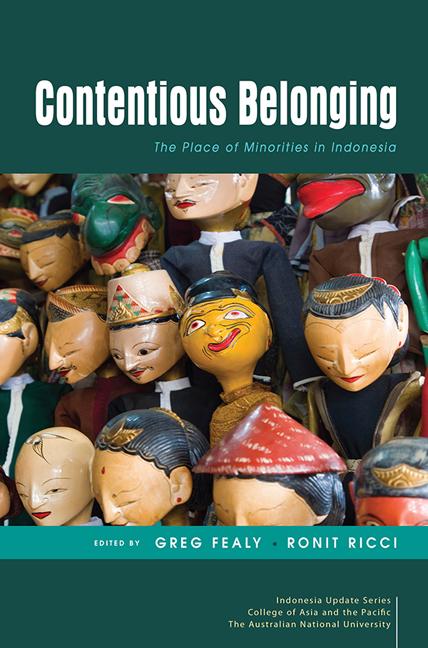Book contents
- Frontmatter
- Contents
- Tables and figures
- Contributors
- Acknowledgments
- Glossary
- Map
- 1 Diversity and its Discontents: an Overview of Minority–Majority Relations in Indonesia
- PART 1 HISTORY AND LAW
- PART 2 DISABILITY
- PART 3 SEXUALITY
- PART 4 RELIGION AND ETHNICITY
- 9 The Mobilisation of Intolerance and its Trajectories: Indonesian Muslims Views of Religious Minorities and Ethnic Chinese
- 10 Disputes Over Places of Worship in Indonesia: Evaluating the Role of the Interreligious Harmony Forum
- 11 Anti-Chinese Sentiment and the ‘Return’ of the Pribumi Discourse
- 12 Minority and Advantage: the Story of Sindhis in Indonesia
- 13 ‘Normalising’ the Orang Rimba: Between Mainstreaming, Marginalising and Respecting Indigenous Culture
- PART 5 REFLECTIONS
- Index
- Indonesia Update Series
12 - Minority and Advantage: the Story of Sindhis in Indonesia
from PART 4 - RELIGION AND ETHNICITY
Published online by Cambridge University Press: 06 September 2019
- Frontmatter
- Contents
- Tables and figures
- Contributors
- Acknowledgments
- Glossary
- Map
- 1 Diversity and its Discontents: an Overview of Minority–Majority Relations in Indonesia
- PART 1 HISTORY AND LAW
- PART 2 DISABILITY
- PART 3 SEXUALITY
- PART 4 RELIGION AND ETHNICITY
- 9 The Mobilisation of Intolerance and its Trajectories: Indonesian Muslims Views of Religious Minorities and Ethnic Chinese
- 10 Disputes Over Places of Worship in Indonesia: Evaluating the Role of the Interreligious Harmony Forum
- 11 Anti-Chinese Sentiment and the ‘Return’ of the Pribumi Discourse
- 12 Minority and Advantage: the Story of Sindhis in Indonesia
- 13 ‘Normalising’ the Orang Rimba: Between Mainstreaming, Marginalising and Respecting Indigenous Culture
- PART 5 REFLECTIONS
- Index
- Indonesia Update Series
Summary
Most academic discussions on ethnic and religious minorities in Indonesia have focused either on the state's unilateral dominance over various minority groups or the resistance of those groups to state power. While revealing key aspects of ethno-religious conflict, such discourses can be misleading as they are based on two assumptions: first, that minority status equals disadvantage, and second, that in order to preserve their identities minorities have to actively confront the state. Although it is true that minorities do often find themselves in a vulnerable position vis-à-vis state power and/or an ethnic and religious majority, assuming that disadvantage is inherent to a minority status is erroneous. Moreover, an approach that focuses solely on active resistance, while ignoring other forms of identity negotiations, presents just a part of the story, albeit a very significant one.
I argue that minority status can signal an advantage, even privilege, over a majority of the country's population. I also argue that disregard of state power, often in the form of disregarding both obligations and rights, can be an effective way to preserve a distinct identity. The story of the Sindhis in Indonesia is precisely about advantage, and in some cases privilege, that has stemmed from ethnic minority status and global power dynamics. It is also a story of the generally neutral relations between the minority and the state when both had very few points of interaction and those rarely turned into pressure points. Overall, the relations between the Sindhi minority and the state do not fit into the commonly used frameworks of forced assimilation or targeted discrimination and marginalisation.
So who are the Sindhis in Indonesia? Originally from Sindh, the former territory of British India and currently part of the Islamic Republic of Pakistan, Sindhis claim Indian, rather than Pakistani, identity and maintain an exclusionist, endogamous way of life. They see business as the core of life, practise a form of Hinduism that is heavily influenced by Buddhism, Sikhism and Sufism, and constitute one of the wealthiest and most well-connected trading communities in the world, the Sindhayat (Markovits 2000). There are approximately 10,000 Sindhis in Indonesia, making them a tiny minority in a population of around 260 million. With very few conversions to Christianity or Islam, Hindu Sindhis are a ‘double minority’ in a largely Muslim population.
- Type
- Chapter
- Information
- Contentious BelongingThe Place of Minorities in Indonesia, pp. 214 - 231Publisher: ISEAS–Yusof Ishak InstitutePrint publication year: 2019



